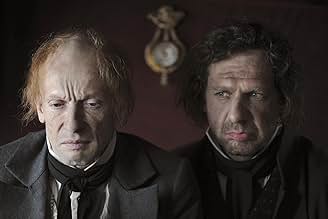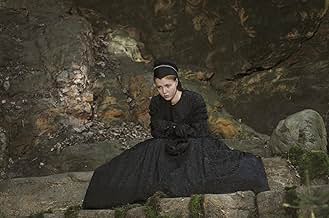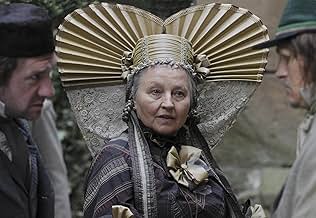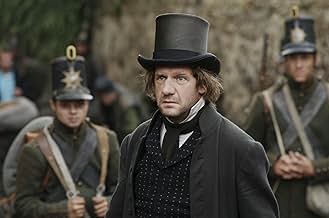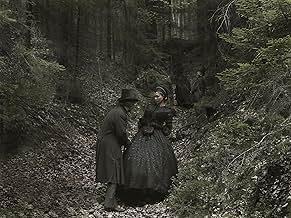NOTE IMDb
6,5/10
5,9 k
MA NOTE
Un érudit désespéré vend son âme au diable en échange d'une nuit avec une magnifique jeune femme.Un érudit désespéré vend son âme au diable en échange d'une nuit avec une magnifique jeune femme.Un érudit désespéré vend son âme au diable en échange d'une nuit avec une magnifique jeune femme.
- Réalisation
- Scénario
- Casting principal
- Récompenses
- 15 victoires et 27 nominations au total
Eva-Maria Kurz
- Faust's Cook
- (as Eva Kurz)
Avis à la une
a question more than a film. nothing surprising for Sokurov.because not the story is the axis but the atmosphere the air who seems be mud, the dialogues who are cold and bitter, the actors who becomes shadows. a film who propose the world in precise slices. and that is the source of controversies and the heart of a fascinating film about reality and choices. far to be comfortable, it is a challenge. because it propose the aesthetic of ugly things, because firs scene is an open corpse and the pact with devil has different nuances by the classic text of Goethe. but the idea is the same.same, the need of certitude. a film about the taste of knowledge. and the essence of self definition.
Aleksandr Sokurov's take at Faust is a courageous act. Yet, my issues with this movie have nothing to do with the discussion whether a Russian director might understand the essence of Goethe's work. This is a futile debate, because Sokurov comes closer to Goethe than an average Westerner to Russian classics, as displayed in Joe Wright's Anna Karenina (2011).
In Faust, Sokurov did what he's done before. There are rather realistic, almost documentary images and there are dream-like sequences. We've seen the former in, for example, the trilogy of Moloch (1999), Taurus (2001) and The Sun (2005). And we've seen the latter in, for example, Russian Ark (2002) and Alexandra (2007). So what went wrong?
Again, i'm expressing my views here and won't try to judge Sokurov's talents and abilities. In Faust we kick off with the daily work of Dr. Faust and progress toward the space beyond reality. Whether it is a higher plane of existence or main character's hallucination is left unclear, yet it portrays well his inner state, triggered by malnutrition and selling the soul. Personally, at a certain point i found this movie difficult to watch...
In Faust, Sokurov did what he's done before. There are rather realistic, almost documentary images and there are dream-like sequences. We've seen the former in, for example, the trilogy of Moloch (1999), Taurus (2001) and The Sun (2005). And we've seen the latter in, for example, Russian Ark (2002) and Alexandra (2007). So what went wrong?
Again, i'm expressing my views here and won't try to judge Sokurov's talents and abilities. In Faust we kick off with the daily work of Dr. Faust and progress toward the space beyond reality. Whether it is a higher plane of existence or main character's hallucination is left unclear, yet it portrays well his inner state, triggered by malnutrition and selling the soul. Personally, at a certain point i found this movie difficult to watch...
it is not the best Faust adaptation. the form is different, the Sokurov ambition to create his story is obvious, the images are pieces from same material of others movies by him. but it is far to be the worst adaptation. short, the lead character of film is the director. and this character is Mephisto in clothes of Faust. the dark scenes, the atmosphere, the dialogs, the Georgian young man or Isolda Dychauk as Renaissance Madonna/Margareta, the first scene and the last, each is letter of a letter who desire say more than its text. a profound film and not uninspired game with a delicate subject. good performance, interesting presence of Hanna Schygulla, smart manner to translate to present the Goethe drama. but , more than philosophic movie, it is a too complicated labyrinth. the ambition is to impress with entire force. but something missing. maybe, the soul.
It begins with the evisceration of a corpse, and that could be a metaphor for the way this alleged adaptation proceeds - except that Goethe's "Faust" is not dead, only given the dead-letter treatment here. The film's emphasis is on gross, clumsy physicality: you never saw so many actors stumble as they walk, bumping into things and one another; too artless and unfunny for slapstick, the universal jostling is prevented from being laughable by funereal pacing and the array of hangdog faces. Since the Faust figure (Johannes Zeiler) conveys very little in the way of intellect, all that elevates him is that most of the other characters have been made open-mouthed gapers, presumable halfwits. Wit is barred out anyway by the color-palette, all various hues of mud - the surest sign of high-serious intentions in movies nowadays. In exterior shots the sky is overexposed so it shows as a gleamless white blur; the earth is dun-colored, greens are gray-tinged, and reds are virtually absent, on their rare appearance tending to brown, like bloodstained linens oxidizing. The cut of the men's clothing updates the story to several decades after Goethe's time: trousers are worn, rather than breeches and hose. The fabrics are thick, heavy, coarse, and of course dark-dyed and fraying badly. No one could think of playing the dandy here. Strangely, there seems to be no Republic of Letters either. The few characters with intellectual interests neither write nor receive letters; they're isolated from enlightenment and worldly affairs: no one awaits the postman; no one looks at a journal of science or politics or the arts - this is a stupefying omission, as false to the historical period as it would be to Goethe's own. Sokurov's flight from historical particulars strands his Faust: the fable and the character become "timeless" in all the wrong ways. Faust doesn't represent his age's high hopes, or its seeds of self-destruction; but then he doesn't represent our age either. Sealed off in its remoteness, Sokurov's "Faust" is just another - all-too-familiar - sulking, glooming art-house reverie.
The way Sokurov treats this story makes it clear that his characters are all immersed in the day tot day doings, the earthly aspects of our lives, and it is hard or even impossible to escape. He brings it home to us, he gets us involved through his camera and sound, Faust becomes us. The first time I know of that this story was told in such a way that we can actually get inside Faust. Sokurov brings home some intriguing themes. Is Faust's soul maybe already missing from the start? What is our perception of Faust's hell and/or heaven, and how easy are we manipulated? We don't seem to need a lot of arguments and talking to win us over...
Le saviez-vous
- AnecdotesIt won the Golden Lion award at the 2011 Venice Film Festival. It is the 3rd Russian film to be crowned best film in Venice, after Ivan's Childhood (1962) and The Return (2003).
- ConnexionsFeatured in At the Movies: Venice Film Festival 2011 (2011)
- Bandes originalesSalve Regina
(uncredited)
Gregorian chant
Meilleurs choix
Connectez-vous pour évaluer et suivre la liste de favoris afin de recevoir des recommandations personnalisées
- How long is Faust?Alimenté par Alexa
Détails
- Date de sortie
- Pays d’origine
- Sites officiels
- Langue
- Aussi connu sous le nom de
- Fausto
- Lieux de tournage
- Sociétés de production
- Voir plus de crédits d'entreprise sur IMDbPro
Box-office
- Budget
- 8 000 000 € (estimé)
- Montant brut aux États-Unis et au Canada
- 58 132 $US
- Week-end de sortie aux États-Unis et au Canada
- 10 030 $US
- 17 nov. 2013
- Montant brut mondial
- 64 556 $US
- Durée2 heures 20 minutes
- Mixage
- Rapport de forme
- 1.37 : 1
Contribuer à cette page
Suggérer une modification ou ajouter du contenu manquant



